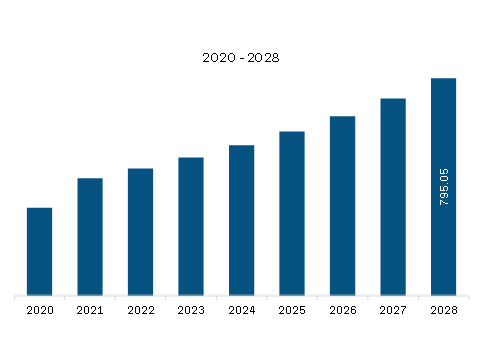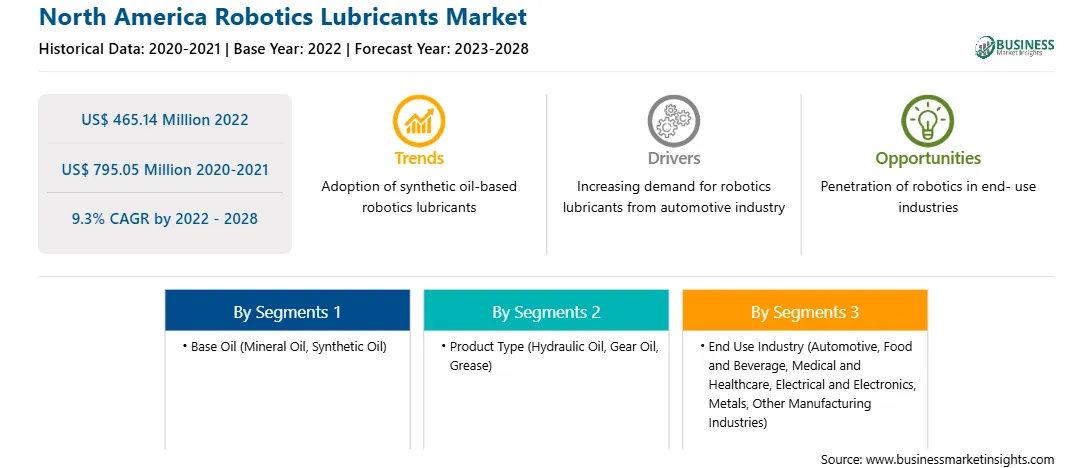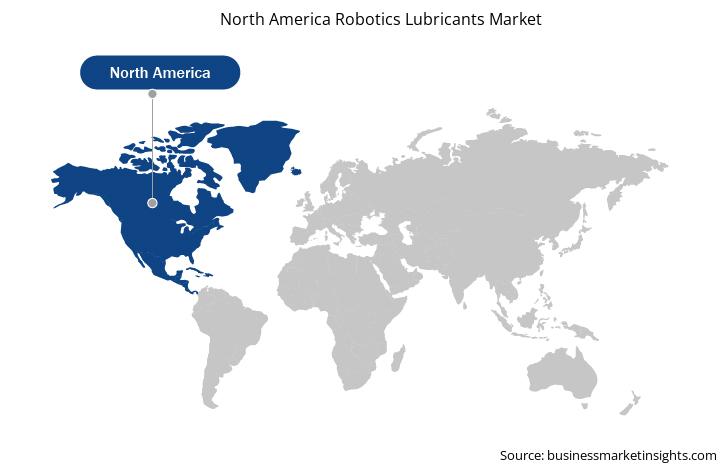The rising vehicle production resulted in the adoption of automation in the automotive industry. Automation and the use of industrial robots increase the operational efficiency and productivity in automotive assembly plants. Industrial robots increase the productivity of manufacturing operations and positively impact industrial competitiveness. Further, there is an inverse relationship between industrial robot density and work hours, i.e., an increase in industrial robot density results in decreased work hours. According to a report published by the US Census Bureau in 2022, the motor vehicle, body trailer, and vehicle component manufacturing industry invested US$ 1,923 million in robotic equipment in 2021. Industrial robots perform diverse operations, from material handling, assembly, and welding to finishing and palletizing applications. Robotic components are subjected to extensive movement, high heat, high speed, and friction, thus requiring periodic inspection and servicing. The automotive industry requires optimized robotics lubricants that are tolerant to extreme temperatures, can minimize downtime, and help achieve long service intervals. Thus, the increasing demand for robots in the automotive industry is driving the North America robotics lubricants market.
The adoption of robotics and automation has grown in North America in the past few years, especially in the manufacturing sector, to boost productivity and reduce operational costs. The constant material handling and operations by robots lead to the wear and corrosion of robotic components. The utilization of robotics oil and greases enhance service life and reduce downtime of robotic components. According to the Association for Advancing Automation, the companies in North America ordered ~44,196 robots in 2022, with a sale of US$ 2.38 billion. The report revealed a growth in robot order size by 11% and a rise in sales value by 18% in 2022 compared to 2021. Rising operations of automotive companies were the major driving factor for growing sales of robots in the region, contributing to more than 50% of total robot sales in 2022. In North America, rising production of electric vehicles prompted automotive sector to accelerate automation and robotic installations, which in turn has increased the demand for robots. Robot sales by North American companies grew by 24% in 2022 compared to 2021 and accounted for the sales of 35,804 robots in the first 9 months of 2022. According to the press release by the International Federation of Robotics 2022, robot orders by automotive and associated components manufacturers grew by 15% year-on-year in 2022. Moreover, automotive industries are focused on expansion projects pertaining to the advancement of factories and an increase in battery production capacity, which, in turn, is expected to create a demand for industrial robots during the forecast period. Thus, the rise in robot sales in the region is anticipated to boost the demand for robotics lubricants.
Strategic insights for the North America Robotics Lubricants provides data-driven analysis of the industry landscape, including current trends, key players, and regional nuances. These insights offer actionable recommendations, enabling readers to differentiate themselves from competitors by identifying untapped segments or developing unique value propositions. Leveraging data analytics, these insights help industry players anticipate the market shifts, whether investors, manufacturers, or other stakeholders. A future-oriented perspective is essential, helping stakeholders anticipate market shifts and position themselves for long-term success in this dynamic region. Ultimately, effective strategic insights empower readers to make informed decisions that drive profitability and achieve their business objectives within the market. The geographic scope of the North America Robotics Lubricants refers to the specific areas in which a business operates and competes. Understanding local distinctions, such as diverse consumer preferences (e.g., demand for specific plug types or battery backup durations), varying economic conditions, and regulatory environments, is crucial for tailoring strategies to specific markets. Businesses can expand their reach by identifying underserved areas or adapting their offerings to meet local demands. A clear market focus allows for more effective resource allocation, targeted marketing campaigns, and better positioning against local competitors, ultimately driving growth in those targeted areas.
North America Robotics Lubricants Strategic Insights

North America Robotics Lubricants Report Scope
Report Attribute
Details
Market size in 2022
US$ 465.14 Million
Market Size by 2028
US$ 795.05 Million
Global CAGR (2022 - 2028)
9.3%
Historical Data
2020-2021
Forecast period
2023-2028
Segments Covered
By Base Oil
By Product Type
By End Use Industry
Regions and Countries Covered
North America
Market leaders and key company profiles
North America Robotics Lubricants Regional Insights

North America Robotics Lubricants Market Segmentation
The North America Robotics lubricants market is segmented into base oil, product type, end use industry, and country.
Based on base oil, the North America robotics lubricants market is segmented into mineral oil, synthetic oil, and others. In 2022, the mineral oil segment registered a largest share in the North America robotics lubricants market.
Based on product type, the North America robotics lubricants market is segmented into hydraulic oil, gear oil, and grease. In 2022, the grease segment registered a largest share in the North America robotics lubricants market.
Based on end use industry, the North America robotics lubricants market is segmented into automotive, food and beverage, medical and healthcare, electrical and electronics, metals, and other manufacturing industries. In 2022, the automotive segment registered a largest share in the North America robotics lubricants market.
Based on country, the North America robotics lubricants market is segmented into the US, Canada, Mexico. In 2022, the US segment registered a largest share in the North America robotics lubricants market.
BP Plc, Fuchs Petrolub SE, Idemitsu Kosan Co Ltd, Kluber Lubrication GmbH & Co KG, Miller-Stephenson Inc, Schaeffler Austria GmbH, and Shell Plc are the leading companies operating in the North America robotics lubricants market.
The North America Robotics Lubricants Market is valued at US$ 465.14 Million in 2022, it is projected to reach US$ 795.05 Million by 2028.
As per our report North America Robotics Lubricants Market, the market size is valued at US$ 465.14 Million in 2022, projecting it to reach US$ 795.05 Million by 2028. This translates to a CAGR of approximately 9.3% during the forecast period.
The North America Robotics Lubricants Market report typically cover these key segments-
The historic period, base year, and forecast period can vary slightly depending on the specific market research report. However, for the North America Robotics Lubricants Market report:
The North America Robotics Lubricants Market is populated by several key players, each contributing to its growth and innovation. Some of the major players include:
The North America Robotics Lubricants Market report is valuable for diverse stakeholders, including:
Essentially, anyone involved in or considering involvement in the North America Robotics Lubricants Market value chain can benefit from the information contained in a comprehensive market report.